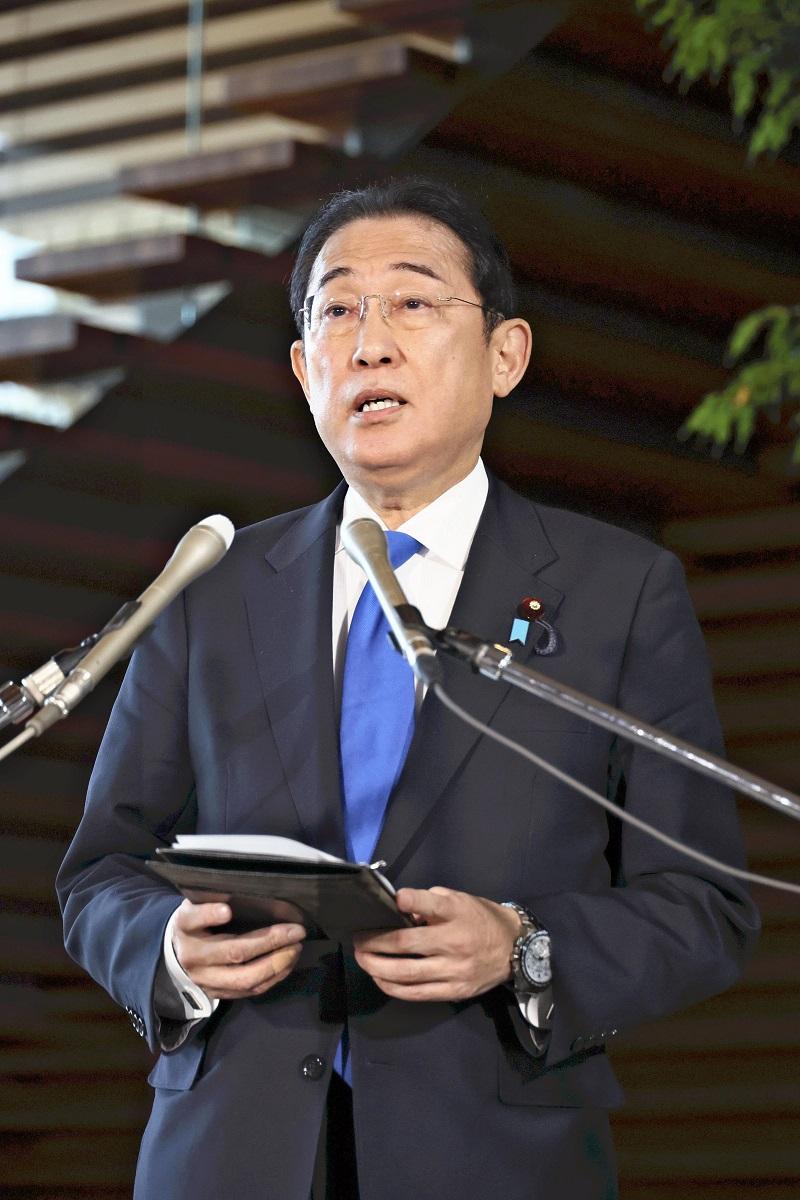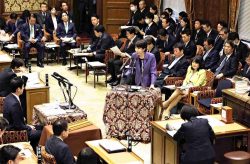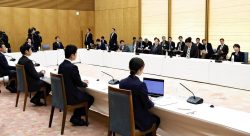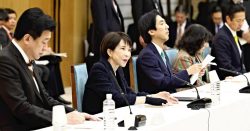China Agrees to Resume Imports of Japanese Marine Products; Decision is Expected to Improve Worsening Bilateral Relations

Kishida speaks with reporters after the phone conversation with IAEA’s Grossi at the Prime Minister’s Office in Tokyo on Friday.
20:00 JST, September 21, 2024
China, which suspended its imports of Japanese marine products last August in protest of the release of treated water from TEPCO’s Fukushima No. 1 Nuclear Power Plant into the ocean, has agreed with Japan that, it will resume imports.
The latest move is likely to improve bilateral relations. But China has shown no signs of concessions on other pending issues, such as Chinese government vessels having repeatedly entered Japan’s territorial waters near the Senkaku Islands in Okinawa Prefecture.
On top of this, a boy who attended a Japanese school was fatally stabbed by a Chinese assailant recently in Shenzhen, China. The future of bilateral relations remains unclear.
IAEA takes the initiative
“Our country, for its part, welcomes additional monitoring (of the treated water discharge). We have already come to share a certain degree of understanding with China,” said Prime Minister Fumio Kishida to reporters after a telephone conversation with Rafael Grossi, Director General of the International Atomic Energy Agency (IAEA). Kishida added with confidence that there is a prospect that China will lift its embargo on Japanese marine products.
During the year-long negotiations with China toward the lifting of the embargo, the Japanese side has insisted on having the monitoring “led by the IAEA” maintained.
Until now, the Chinese side demanded the implementation of “its own monitoring” in which neither the Japanese government nor the IAEA could be involved.
But the Japanese side continually refused, saying that allowing other countries to freely conduct monitoring within Japan would “have serious bearing upon our sovereignty and is, therefore, out of the question,” as a senior Foreign Ministry official put it.
The latest expansion of monitoring is essentially an initiative taken by the IAEA to make an appeal to other countries about the safety of the treated water.
A senior Japanese government official explained, “If this is done in this way, Japan won’t be seen as making concessions, while China, which has been demanding reinforced monitoring, will also be able to save face.”
With its expansion of the monitoring, Japan has also shown consideration for other countries, including South Korea, which has indicated its understanding of the release of treated water.
Lowering the raised fist
Lying behind the latest bilateral accord is Beijing’s desire to improve relations with Japan, in the hope that it will invest more in China, which has been in a prolonged economic slump.
Those Pacific island nations that, in step with China, have expressed concern over the release of treated water into the ocean, have also gradually softened their stances.
In the summit declaration at the Pacific Islands Leaders Meeting held by Japan and the Pacific island nations in July, the leaders called the IAEA “the authority on nuclear safety” and agreed on the importance of a response based on scientific evidence.
Apparently having sensed that it was at a disadvantage, China had been looking for a way to lower the fist that it had raised in opposition to the water release.
According to a source in China’s state media, the number of news reports on the treated water has drastically decreased recently, a fact which is no doubt in line with the wishes of authorities.
There have also grown such concerns on the Chinese side that it might become difficult to advance relations with Japan in a positive direction, depending on the stance of the next prime minister toward China. This could be one of the reasons why China has rushed to resolve the conflict while Kishida holds office.
A mountain of pending problems
However, there remains a mountain of pending problems between the two countries, including the intrusion into Japan’s territorial waters near the Senkaku Islands by vessels of the China Coast Guard; the detention of a Japanese national by Chinese authorities on suspicion of espionage; and the installation by China of buoys in Japan’s exclusive economic zone (EEZ).
Late last month, it was confirmed for the first time that Chinese military aircraft had violated Japanese airspace. The fatal stabbing of a schoolboy in Shenzhen has also given a great shock to Japanese residents in China and will inevitably have a serious negative impact on Japan-China relations. As one government official pointed out, “the road to better relations will be a rocky one.”
Top Articles in Politics
-

Japan PM Takaichi’s Cabinet Resigns en Masse
-

Sanae Takaichi Elected Prime Minister of Japan; Keeps All Cabinet Appointees from Previous Term
-

Japan’s Govt to Submit Road Map for Growth Strategy in March, PM Takaichi to Announce in Upcoming Policy Speech
-

LDP Wins Historic Landslide Victory
-

LDP Wins Landslide Victory, Secures Single-party Majority; Ruling Coalition with JIP Poised to Secure Over 300 seats (UPDATE 1)
JN ACCESS RANKING
-

Producer Behind Pop Group XG Arrested for Cocaine Possession
-

Japan PM Takaichi’s Cabinet Resigns en Masse
-

Man Infected with Measles Reportedly Dined at Restaurant in Tokyo Station
-

Israeli Ambassador to Japan Speaks about Japan’s Role in the Reconstruction of Gaza
-

Videos Plagiarized, Reposted with False Subtitles Claiming ‘Ryukyu Belongs to China’; Anti-China False Information Also Posted in Japan

























